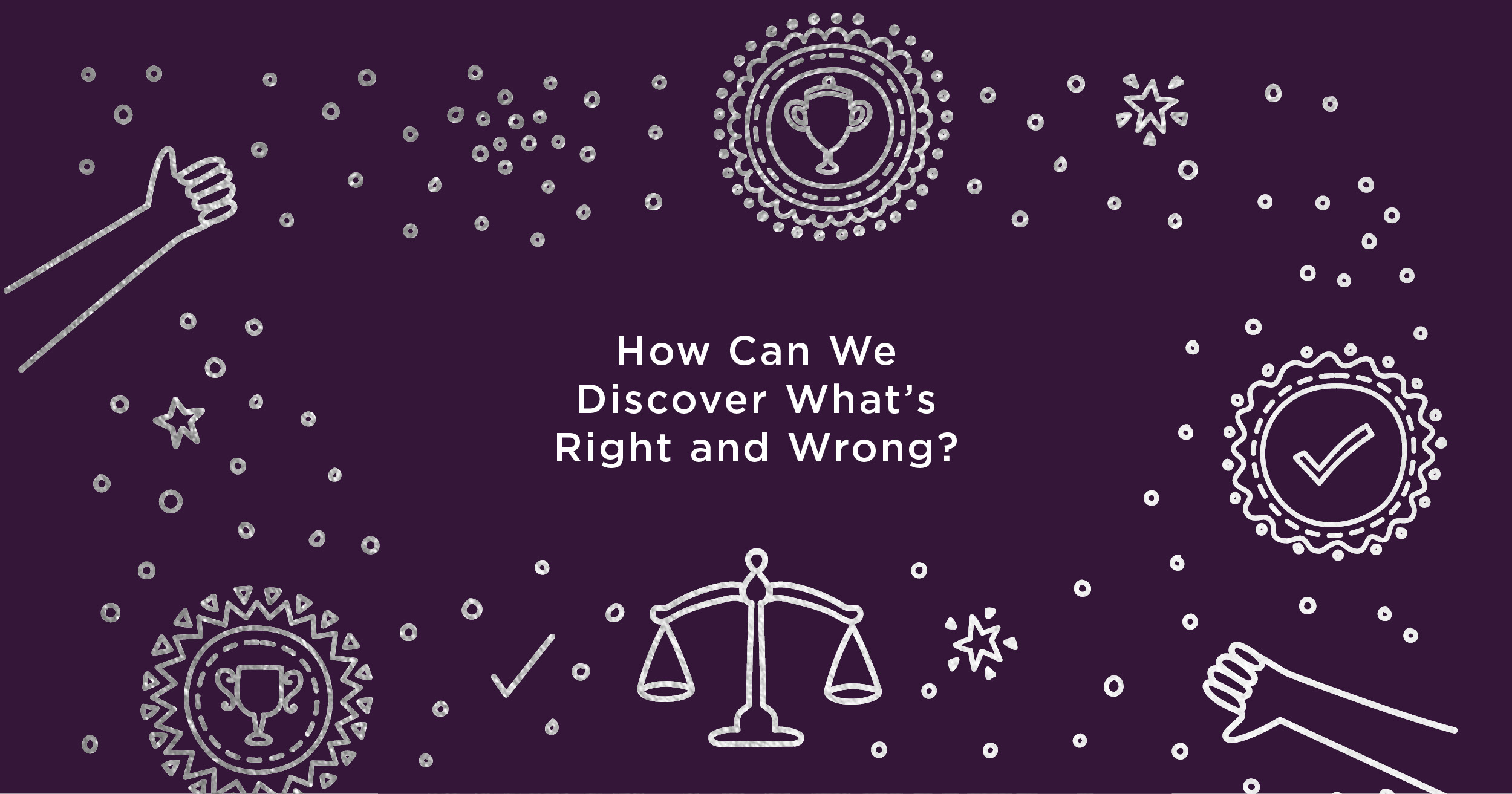
As far as I can see, we’ve basically got two options. Option 1 is that “right” and “wrong” are really just ideas that human beings have invented for themselves. They might be really helpful ideas that keep society running and (sometimes) stop us all from murdering each other—but in the end, they’re still just categories we made up. They’re not unchangeable facts about the universe. They’re just ideas we (sometimes) agree on. Which, to me, sounds a whole lot like we’re all trying really hard to believe in something that doesn’t actually exist.
If right and wrong don’t start with us—then where do they start?
Option 2 is that right and wrong are bigger than us— that they are unchangeable facts about the universe, as true and real as biology and chemistry and physics. Even if every single person in the world agreed that slavery or bullying or murder or abandoning newborn babies on the street was right, it would still be wrong, because morality isn’t something we just get to invent and reinvent however we choose.
But if my hunch is right that Option 2 is the truth—if right and wrong don’t start with us—then where do they start?
I have friends who would tell you that the best way to explain our deep feelings about right and wrong is to look at the way our species has evolved.
If you’re a little fuzzy on the theory of evolution, the idea is that, in nature, the biggest game in town is survival. The better suited to your environment you are, the more likely you are to survive long enough to pass your DNA on to the next generation.
What this means is that, over time, a species will develop and change, generally holding onto traits that help it survive and losing traits that make it more likely to get killed or eaten.
When it comes to morality, the idea goes that, way back in the distant past, our ancestors who worked together tended to survive longer and more often than our ancestors who didn’t—and so, over the countless generations, that instinct to stick together became deeper and deeper and stronger and stronger. Then, as they developed the ability to speak, our ancestors started sharing more complex information and stories that helped us survive together in groups. Now it wasn’t just our DNA that shaped how our species developed and changed; it was our ideas.
Fast-forward to today, and we have these deep feelings about right and wrong, but the true source of those feelings is our evolutionary history. For the most part, the beliefs and behaviours we call right are the ones that, in the past, helped us to survive, while the beliefs and behaviours we call wrong are the ones that made us more likely to die.
While science does a great job of helping us understand how things are, it has nothing to say about how things should be.
Now, I’m guessing that readers of this book will have various opinions about evolution as a way of explaining where human beings came from—but whatever your view, let me tell you why I’m not sure this explanation helps us out with the question of morality quite as much as some people think.
The first thing to say is that, while science does a great job of helping us understand how things are, it has nothing to say about how things should be.
In nature, when a group of lions attacks a herd of antelope, the antelope all make a run for it, and the ones that get picked off and eaten tend to be the slowest and weakest— often the very young or the very old.
Now, you might find that sad, but no one’s suggesting we round up the lions and throw them into prison for hunting antelope; and no one’s suggesting we throw the faster, stronger antelope into prison for leaving their family behind either. These animals aren’t being evil; they’re just being animals.
On the other hand, if a strong, powerful country invades and enslaves a weaker, less powerful country…
Or if a fit, strong, healthy mum or dad runs out of a burning building, leaving grandma and the kids inside to take care of themselves…
I mean, we have a problem with that, right?
We say strong nations shouldn’t use their power to destroy weak nations. We say a fit and healthy parent should do what they can to help the vulnerable people in the family.
But why?
We don’t blame stronger animals for eating weaker animals, or for leaving them behind to get eaten—and if evolution is the whole story, aren’t we just animals too? Isn’t the strong surviving and the weak dying absolutely natural and normal? Isn’t that just how life works?
You might say, “Yeah, but animals don’t know any better. Humans do. We have a responsibility to be good to each other.”
But that just brings us back around to the same set of questions: Who are you to say what’s “better”? Who are you to say what’s “good”? Who are you to say what anyone else is “responsible” for?
I mean, don’t get me wrong, I agree with you. But we didn’t get that from nature. Nature might help explain why we feel this way, but that doesn’t make it true.
If it is true, then that truth comes from somewhere else altogether.
This is an extract adapted from How Can I Be Sure What’s Right and Wrong? In this book, part of Chris Morphew’s Big Questions series, tweens and teens will learn where morality comes from, that there is such a thing as right and wrong, and that they need to go to God for solid and satisfying answers.